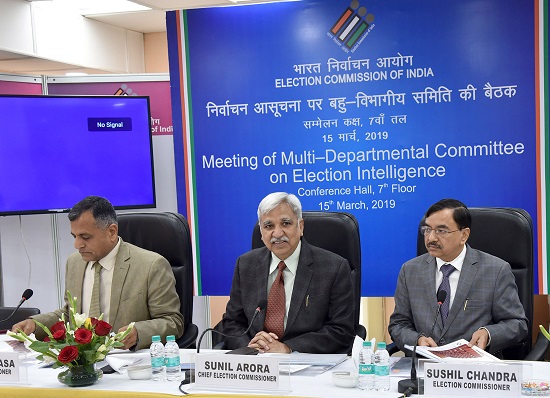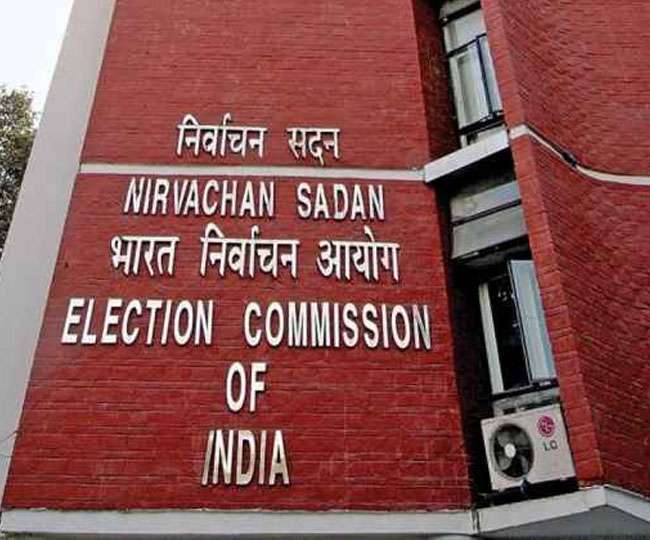
Indian voters are not as dumb as the Election Commission thinks them to be. EC needs to think of fresh ideas that could make elections in India truly participative and enjoyable.
The ongoing parliament election has exposed all the chinks in the armour of Election Commission. Its handling of electioneering has been completely ham-handed, to say the least. Instead of smoothly conducting the electoral orchestra, it stands out as a helpless spectator as politicians blatantly seek votes on the basis of caste and religion, abuse each other in the vilest of words — day in and day out and make wild and false promises to waylay gullible voters. And, what the Election Commission does is to seek replies from repeat offenders, issue warnings to desist from foul-mouthing and threatening to cede from India, reprimand some, more out of irritation and make seizures of cash and a few bottles of liquor here and there. It hasn’t mustered the courage to either disfranchise an erring political party or debar a candidate from contesting or campaigning.
Strangely, it has a problem if NDA (National Democratic Alliance) presents its credentials of being an alliance which makes zero compromise on national security and cites surgical strikes to prove its point; but it’s fine with the Election Commission if retired bureaucrats, former army officers and a host of artists openly ask voters to cast their ballot against BJP, lest the country plunges in anarchy and disintegrates in numerous Janpadas (provinces). It also has a problem if the ED (Enforcement Directorate) and Income Tax Departments carry out seizure of huge chunks of unaccounted cash across the nation and insists on having prior information about the raids being undertaken. One does not know what the Election Commission will do with advance information of raids unless it wants to help the cheats or stop the agencies from doing their normal work.
It is obvious that the EC is unable to soak the pressure from a barrage of complaints. No wonder, it reacts in hiccups by making all kinds of spurious noises — do not screen this or that movie; do not show any content on the television channel unless it is vetted by its officers; make public the money political parties receive through electoral bonds and obtain its concurrence prior to making appointments; recruitment; announcing schemes and projects and holding public meetings, road shows etc. Actually, it is doing everything that it should not do and failing woefully in its singular duty of holding a free and fair election.
The Election Commission should honestly worry why voter’s turn out is less than 100%, what kind of government it is facilitating people to elect which has a support of less than 30% of the total number of eligible voters. Why lakhs of genuine voters are left out of the electoral list year after year, why Indians settled abroad can vote through postal ballots but not the Indians who move out from the place of their permanent residence to other parts of India in search of jobs? Why can’t it have a permanent mechanism to continuously vet the genuineness of voters and why can’t it ensure that every voter goes out to cast his vote without fear.
These are tough questions and would need an institution to address them that has leaders of mettle, vision and can act tough and decisively. But what you have is a cartel of retired IAS officers who are loyalists and favourites of parties in power. Most of them dutifully go by what their appointees direct. A few try to make a show of independence and a fetish for rebellion. The problem is that since it has members from the same tribe, they have a strong tribal loyalty and their decisions cannot be anything but uniform, and reactions knee-jerk. It was precisely to avoid this tunnel approach that a three-member commission had been constituted to make sure that decisions are taken based on varied inputs from experts who have no loyalty to a particular group or service.
The model code of conduct reflects an absurd belief that people firm up their choice of candidates only between the time election dates are announced and results are known. And therefore the Election Commission must ensure that no one violates its provisions to influence voters during this period. Not only this thinking is flawed but the very construction of Model Code of Conduct (MCC) is whacky. It makes EC disproportionately empowered and master of all what it surveys, albeit for a brief period. The administration of the entire country is placed at its disposal. No administrative decisions can take place without its approval, all developmental initiatives are kept on hold and all state and central governments remain in a limbo. The irony is that the MCC authorizes Election Commission to impose a kind of emergency but its provisions are at best a list of wishful intent and have no legal backing. No wonder, political parties openly defy its provisions with impunity and EC is left to react to such violations erratically.

In this country of million mutinies, you cannot have an event of the magnitude of parliamentary elections organised by a consortium of three retired officers, equipped with pious hopes. We are notorious for championing the cause of liberty of individuals and freedom of expression in all forms. How can you expect discipline, civility and concern for others’ comfort suddenly dawning from warring groups for two months? Therefore, the best way is let go their emotions, spread over a period of five years.
Let there be no time-bound restriction on flow of money, liquor, propaganda, campaigning, public meetings, rallies and on what you speak. The EC only has to ensure that law and order is strictly maintained and normal penal laws are applied ruthlessly against violators like on any other day. Let governments and opposition announce schemes and give doles throughout as much as they like. If someone wants to distribute cash and liquor, freebies, hold rallies and dish out opinion and exit polls at the last moment, let that be his choice. Voters will soon get smart enough to receive money from A and vote for B or they will get disgusted with the crudity of campaigning and decide to stay at home or switch off TV channels and move to street corners to have a sober chat with friends. Let voters learn from experience.
They are after all not so dumb as we think. They evaluate performance of candidates continuously over a period of five years and do not make up their mind at the spur of the moment. Trust their intelligence to know who can look after their interests best. Can’t you see them talking about voting for Narendra Modi whose name is not printed on the ballot paper. Asking them to swear by Holy books to vote for a particular party might work for some time but not forever. Our entire effort should be to take away the last-minute false excitement from campaigning and make it appear routine, drab and a daily activity.
It is about time we think of out-of-the-box solutions to make elections truly participatory. Let’s challenge the Nilekanis’ and the IIT geeks to give us Apps that make it easier for voters to check validity of their electoral cards and get mistakes rectified instantly on a daily basis. Let them write a software that makes it easier for voters to make a choice of either going to booths joyously to cast their ballot along with their family and friends or vote from the comfort of their homes by using postal ballots or some features like OTPs (one time password) popping temporarily on smart phones and laptops. We need to completely ignore rusted views of the likes of Chandrababu Naidus’ and the Mamata Banerjees’ of India, and seriously push for bringing technology to change the landscape of campaigning and voting.
